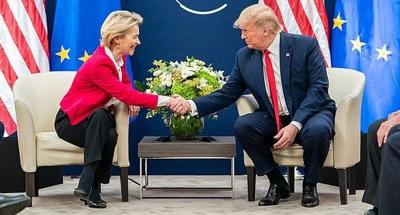The United States and the European Union have finalized a landmark trade agreement valued at $1.6 trillion, marking a significant shift in transatlantic economic relations. The deal, announced on July 27, establishes a 15% tariff on most EU imports to the U.S., averting a potential trade war that had loomed over the global economy. The agreement was reached following intensive negotiations between President Donald Trump and European Commission President Ursula von der Leyen at Trump's Turnberry golf resort in Scotland.
Under the terms of the agreement, the European Union has committed to purchasing $750 billion worth of American energy products and investing an additional $600 billion in the U.S. economy. These investments encompass a broad range of sectors, including energy, defense and technology, signaling a deepening economic partnership between the two regions.
The 15% tariff rate is a compromise between the U.S.'s initial proposal of a 30% tariff and the EU's preference for zero tariffs. Notably, steel and aluminum imports will continue to face a 50% tariff, reflecting ongoing concerns over these sectors. The agreement also includes provisions for the EU to purchase significant amounts of American military equipment, further strengthening the strategic alliance between the U.S. and the EU.
Economists have offered mixed reactions to the deal. While some view the agreement as a positive step towards reducing trade imbalances and fostering economic growth, others express concerns about the potential long-term economic costs of protectionist policies. Analysts note that the deal's asymmetry could lead to higher consumer prices and may impact U.S. economic growth due to tariffs and restricted immigration.
This agreement follows similar recent trade deals the Trump administration has made with countries like the UK, Japan, and Vietnam. The EU deal is seen as Trump's most consequential trade achievement to date, providing a model for future negotiations with other trading partners, including China, Canada, and Mexico. Upcoming trade discussions with these countries remain crucial as the administration seeks further realignment of U.S. trade policy.
The U.S.-EU trade agreement marks a pivotal moment in international trade relations, reflecting a shift towards more assertive and strategic economic policies. As the deal is implemented, its impact on global markets, industries, and geopolitical alliances will unfold, setting the stage for a new era of transatlantic cooperation and competition.
Sources:








(0) comments
Welcome to the discussion.
Log In
Keep it Clean. Please avoid obscene, vulgar, lewd, racist or sexually-oriented language.
PLEASE TURN OFF YOUR CAPS LOCK.
Don't Threaten. Threats of harming another person will not be tolerated.
Be Truthful. Don't knowingly lie about anyone or anything.
Be Nice. No racism, sexism or any sort of -ism that is degrading to another person.
Be Proactive. Use the 'Report' link on each comment to let us know of abusive posts.
Share with Us. We'd love to hear eyewitness accounts, the history behind an article.